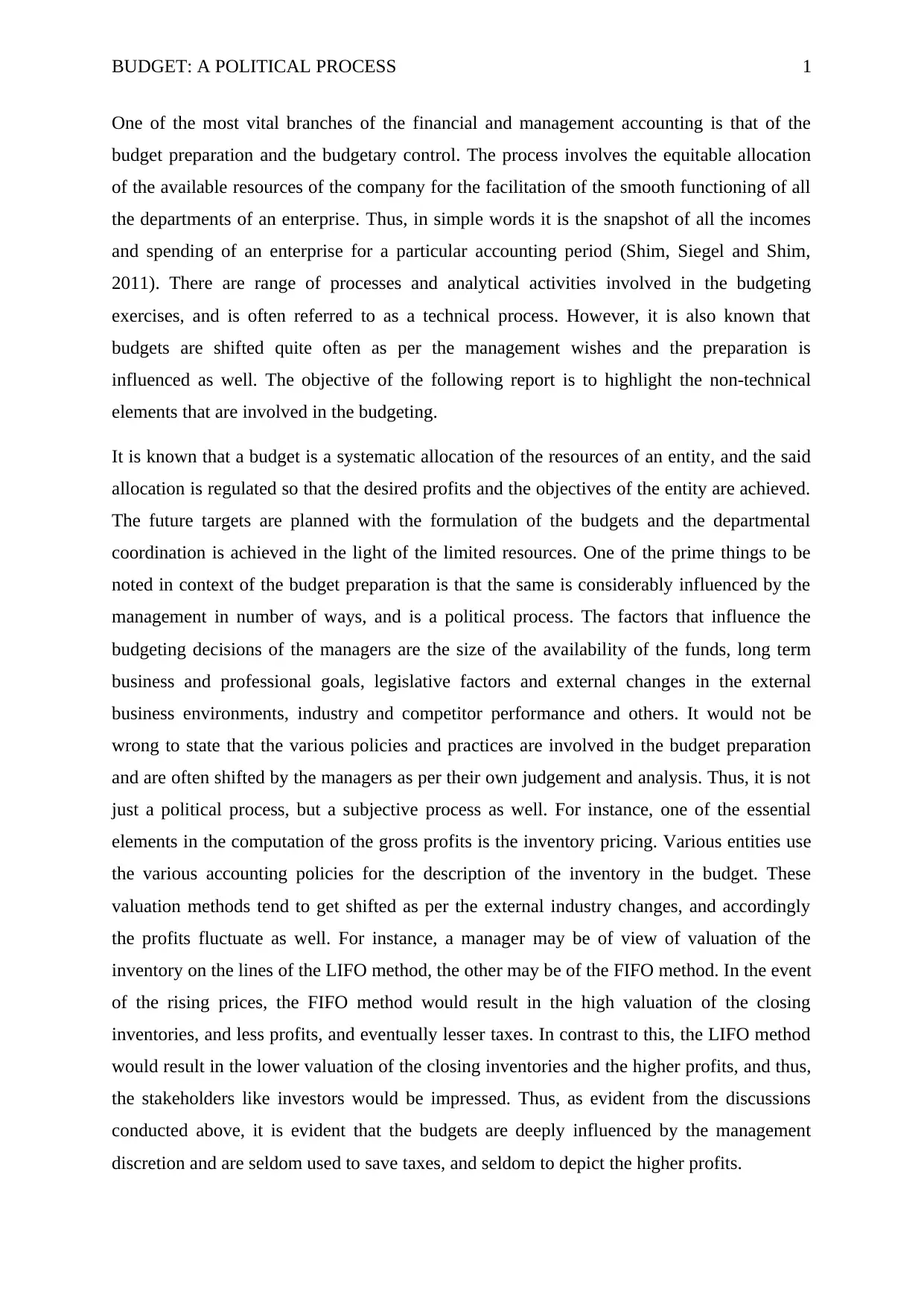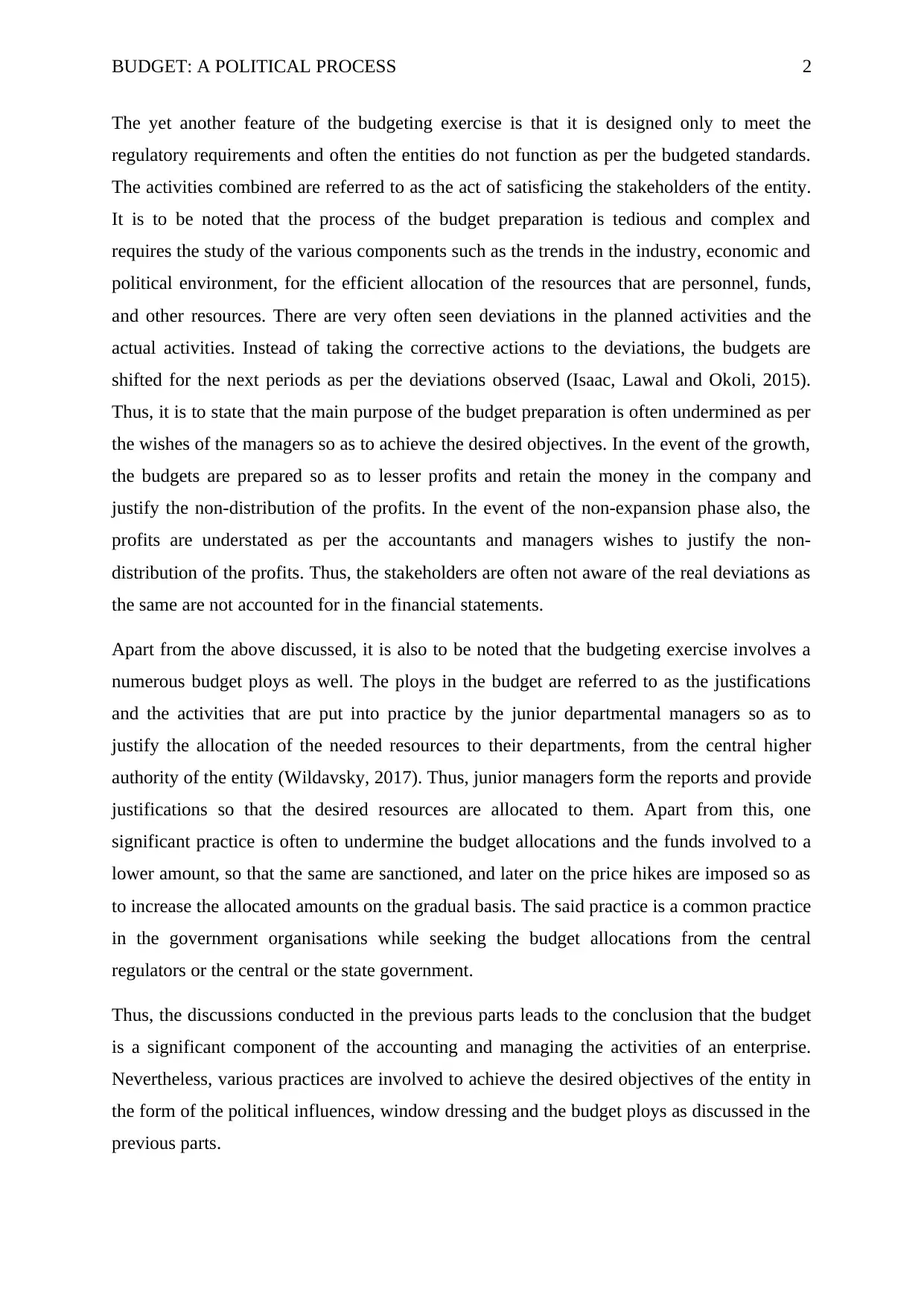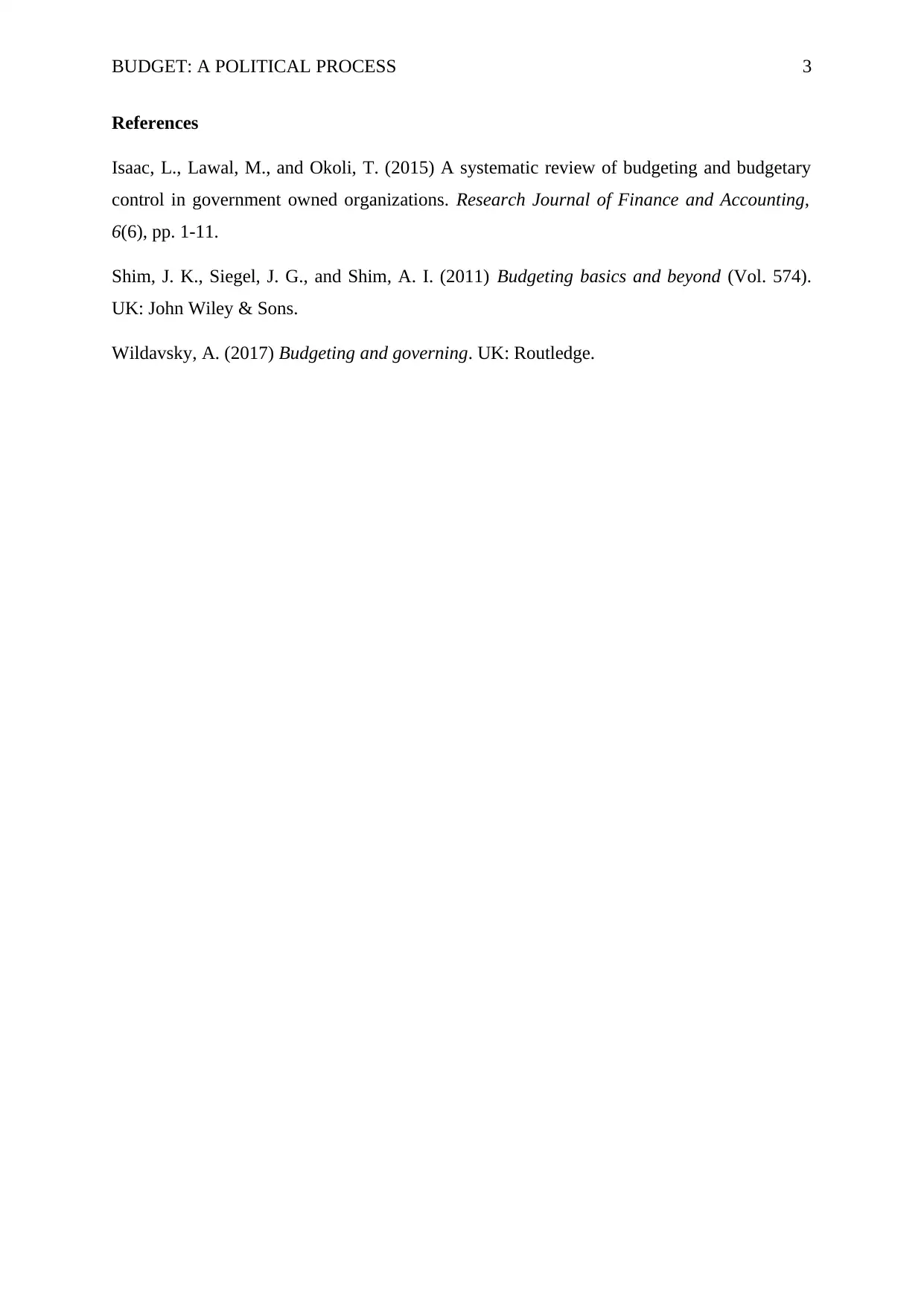ACC2005 Management Accounting: Budgeting as Political Process Report
VerifiedAdded on 2022/08/22
|4
|1149
|21
Report
AI Summary
This report delves into the political aspects of budgeting within management accounting, emphasizing how it extends beyond a purely technical process. It highlights the influence of management discretion, external factors, and internal policies on budget preparation and resource allocation. The report examines how inventory valuation methods and other accounting practices are often manipulated to achieve specific financial outcomes, such as influencing reported profits and tax liabilities. It also discusses the prevalence of budget ploys and the practice of satisficing stakeholders, where budgets may be adjusted to meet regulatory requirements or achieve specific managerial objectives, often at the expense of transparency and accurate financial representation. The report concludes that while budgeting is a critical component of financial management, it is frequently subject to political influences and strategic manipulations to achieve desired goals.

MANAGEMENT ACCOUNTING
Paraphrase This Document
Need a fresh take? Get an instant paraphrase of this document with our AI Paraphraser

BUDGET: A POLITICAL PROCESS 1
One of the most vital branches of the financial and management accounting is that of the
budget preparation and the budgetary control. The process involves the equitable allocation
of the available resources of the company for the facilitation of the smooth functioning of all
the departments of an enterprise. Thus, in simple words it is the snapshot of all the incomes
and spending of an enterprise for a particular accounting period (Shim, Siegel and Shim,
2011). There are range of processes and analytical activities involved in the budgeting
exercises, and is often referred to as a technical process. However, it is also known that
budgets are shifted quite often as per the management wishes and the preparation is
influenced as well. The objective of the following report is to highlight the non-technical
elements that are involved in the budgeting.
It is known that a budget is a systematic allocation of the resources of an entity, and the said
allocation is regulated so that the desired profits and the objectives of the entity are achieved.
The future targets are planned with the formulation of the budgets and the departmental
coordination is achieved in the light of the limited resources. One of the prime things to be
noted in context of the budget preparation is that the same is considerably influenced by the
management in number of ways, and is a political process. The factors that influence the
budgeting decisions of the managers are the size of the availability of the funds, long term
business and professional goals, legislative factors and external changes in the external
business environments, industry and competitor performance and others. It would not be
wrong to state that the various policies and practices are involved in the budget preparation
and are often shifted by the managers as per their own judgement and analysis. Thus, it is not
just a political process, but a subjective process as well. For instance, one of the essential
elements in the computation of the gross profits is the inventory pricing. Various entities use
the various accounting policies for the description of the inventory in the budget. These
valuation methods tend to get shifted as per the external industry changes, and accordingly
the profits fluctuate as well. For instance, a manager may be of view of valuation of the
inventory on the lines of the LIFO method, the other may be of the FIFO method. In the event
of the rising prices, the FIFO method would result in the high valuation of the closing
inventories, and less profits, and eventually lesser taxes. In contrast to this, the LIFO method
would result in the lower valuation of the closing inventories and the higher profits, and thus,
the stakeholders like investors would be impressed. Thus, as evident from the discussions
conducted above, it is evident that the budgets are deeply influenced by the management
discretion and are seldom used to save taxes, and seldom to depict the higher profits.
One of the most vital branches of the financial and management accounting is that of the
budget preparation and the budgetary control. The process involves the equitable allocation
of the available resources of the company for the facilitation of the smooth functioning of all
the departments of an enterprise. Thus, in simple words it is the snapshot of all the incomes
and spending of an enterprise for a particular accounting period (Shim, Siegel and Shim,
2011). There are range of processes and analytical activities involved in the budgeting
exercises, and is often referred to as a technical process. However, it is also known that
budgets are shifted quite often as per the management wishes and the preparation is
influenced as well. The objective of the following report is to highlight the non-technical
elements that are involved in the budgeting.
It is known that a budget is a systematic allocation of the resources of an entity, and the said
allocation is regulated so that the desired profits and the objectives of the entity are achieved.
The future targets are planned with the formulation of the budgets and the departmental
coordination is achieved in the light of the limited resources. One of the prime things to be
noted in context of the budget preparation is that the same is considerably influenced by the
management in number of ways, and is a political process. The factors that influence the
budgeting decisions of the managers are the size of the availability of the funds, long term
business and professional goals, legislative factors and external changes in the external
business environments, industry and competitor performance and others. It would not be
wrong to state that the various policies and practices are involved in the budget preparation
and are often shifted by the managers as per their own judgement and analysis. Thus, it is not
just a political process, but a subjective process as well. For instance, one of the essential
elements in the computation of the gross profits is the inventory pricing. Various entities use
the various accounting policies for the description of the inventory in the budget. These
valuation methods tend to get shifted as per the external industry changes, and accordingly
the profits fluctuate as well. For instance, a manager may be of view of valuation of the
inventory on the lines of the LIFO method, the other may be of the FIFO method. In the event
of the rising prices, the FIFO method would result in the high valuation of the closing
inventories, and less profits, and eventually lesser taxes. In contrast to this, the LIFO method
would result in the lower valuation of the closing inventories and the higher profits, and thus,
the stakeholders like investors would be impressed. Thus, as evident from the discussions
conducted above, it is evident that the budgets are deeply influenced by the management
discretion and are seldom used to save taxes, and seldom to depict the higher profits.

BUDGET: A POLITICAL PROCESS 2
The yet another feature of the budgeting exercise is that it is designed only to meet the
regulatory requirements and often the entities do not function as per the budgeted standards.
The activities combined are referred to as the act of satisficing the stakeholders of the entity.
It is to be noted that the process of the budget preparation is tedious and complex and
requires the study of the various components such as the trends in the industry, economic and
political environment, for the efficient allocation of the resources that are personnel, funds,
and other resources. There are very often seen deviations in the planned activities and the
actual activities. Instead of taking the corrective actions to the deviations, the budgets are
shifted for the next periods as per the deviations observed (Isaac, Lawal and Okoli, 2015).
Thus, it is to state that the main purpose of the budget preparation is often undermined as per
the wishes of the managers so as to achieve the desired objectives. In the event of the growth,
the budgets are prepared so as to lesser profits and retain the money in the company and
justify the non-distribution of the profits. In the event of the non-expansion phase also, the
profits are understated as per the accountants and managers wishes to justify the non-
distribution of the profits. Thus, the stakeholders are often not aware of the real deviations as
the same are not accounted for in the financial statements.
Apart from the above discussed, it is also to be noted that the budgeting exercise involves a
numerous budget ploys as well. The ploys in the budget are referred to as the justifications
and the activities that are put into practice by the junior departmental managers so as to
justify the allocation of the needed resources to their departments, from the central higher
authority of the entity (Wildavsky, 2017). Thus, junior managers form the reports and provide
justifications so that the desired resources are allocated to them. Apart from this, one
significant practice is often to undermine the budget allocations and the funds involved to a
lower amount, so that the same are sanctioned, and later on the price hikes are imposed so as
to increase the allocated amounts on the gradual basis. The said practice is a common practice
in the government organisations while seeking the budget allocations from the central
regulators or the central or the state government.
Thus, the discussions conducted in the previous parts leads to the conclusion that the budget
is a significant component of the accounting and managing the activities of an enterprise.
Nevertheless, various practices are involved to achieve the desired objectives of the entity in
the form of the political influences, window dressing and the budget ploys as discussed in the
previous parts.
The yet another feature of the budgeting exercise is that it is designed only to meet the
regulatory requirements and often the entities do not function as per the budgeted standards.
The activities combined are referred to as the act of satisficing the stakeholders of the entity.
It is to be noted that the process of the budget preparation is tedious and complex and
requires the study of the various components such as the trends in the industry, economic and
political environment, for the efficient allocation of the resources that are personnel, funds,
and other resources. There are very often seen deviations in the planned activities and the
actual activities. Instead of taking the corrective actions to the deviations, the budgets are
shifted for the next periods as per the deviations observed (Isaac, Lawal and Okoli, 2015).
Thus, it is to state that the main purpose of the budget preparation is often undermined as per
the wishes of the managers so as to achieve the desired objectives. In the event of the growth,
the budgets are prepared so as to lesser profits and retain the money in the company and
justify the non-distribution of the profits. In the event of the non-expansion phase also, the
profits are understated as per the accountants and managers wishes to justify the non-
distribution of the profits. Thus, the stakeholders are often not aware of the real deviations as
the same are not accounted for in the financial statements.
Apart from the above discussed, it is also to be noted that the budgeting exercise involves a
numerous budget ploys as well. The ploys in the budget are referred to as the justifications
and the activities that are put into practice by the junior departmental managers so as to
justify the allocation of the needed resources to their departments, from the central higher
authority of the entity (Wildavsky, 2017). Thus, junior managers form the reports and provide
justifications so that the desired resources are allocated to them. Apart from this, one
significant practice is often to undermine the budget allocations and the funds involved to a
lower amount, so that the same are sanctioned, and later on the price hikes are imposed so as
to increase the allocated amounts on the gradual basis. The said practice is a common practice
in the government organisations while seeking the budget allocations from the central
regulators or the central or the state government.
Thus, the discussions conducted in the previous parts leads to the conclusion that the budget
is a significant component of the accounting and managing the activities of an enterprise.
Nevertheless, various practices are involved to achieve the desired objectives of the entity in
the form of the political influences, window dressing and the budget ploys as discussed in the
previous parts.
⊘ This is a preview!⊘
Do you want full access?
Subscribe today to unlock all pages.

Trusted by 1+ million students worldwide

BUDGET: A POLITICAL PROCESS 3
References
Isaac, L., Lawal, M., and Okoli, T. (2015) A systematic review of budgeting and budgetary
control in government owned organizations. Research Journal of Finance and Accounting,
6(6), pp. 1-11.
Shim, J. K., Siegel, J. G., and Shim, A. I. (2011) Budgeting basics and beyond (Vol. 574).
UK: John Wiley & Sons.
Wildavsky, A. (2017) Budgeting and governing. UK: Routledge.
References
Isaac, L., Lawal, M., and Okoli, T. (2015) A systematic review of budgeting and budgetary
control in government owned organizations. Research Journal of Finance and Accounting,
6(6), pp. 1-11.
Shim, J. K., Siegel, J. G., and Shim, A. I. (2011) Budgeting basics and beyond (Vol. 574).
UK: John Wiley & Sons.
Wildavsky, A. (2017) Budgeting and governing. UK: Routledge.
1 out of 4
Related Documents
Your All-in-One AI-Powered Toolkit for Academic Success.
+13062052269
info@desklib.com
Available 24*7 on WhatsApp / Email
![[object Object]](/_next/static/media/star-bottom.7253800d.svg)
Unlock your academic potential
Copyright © 2020–2026 A2Z Services. All Rights Reserved. Developed and managed by ZUCOL.




